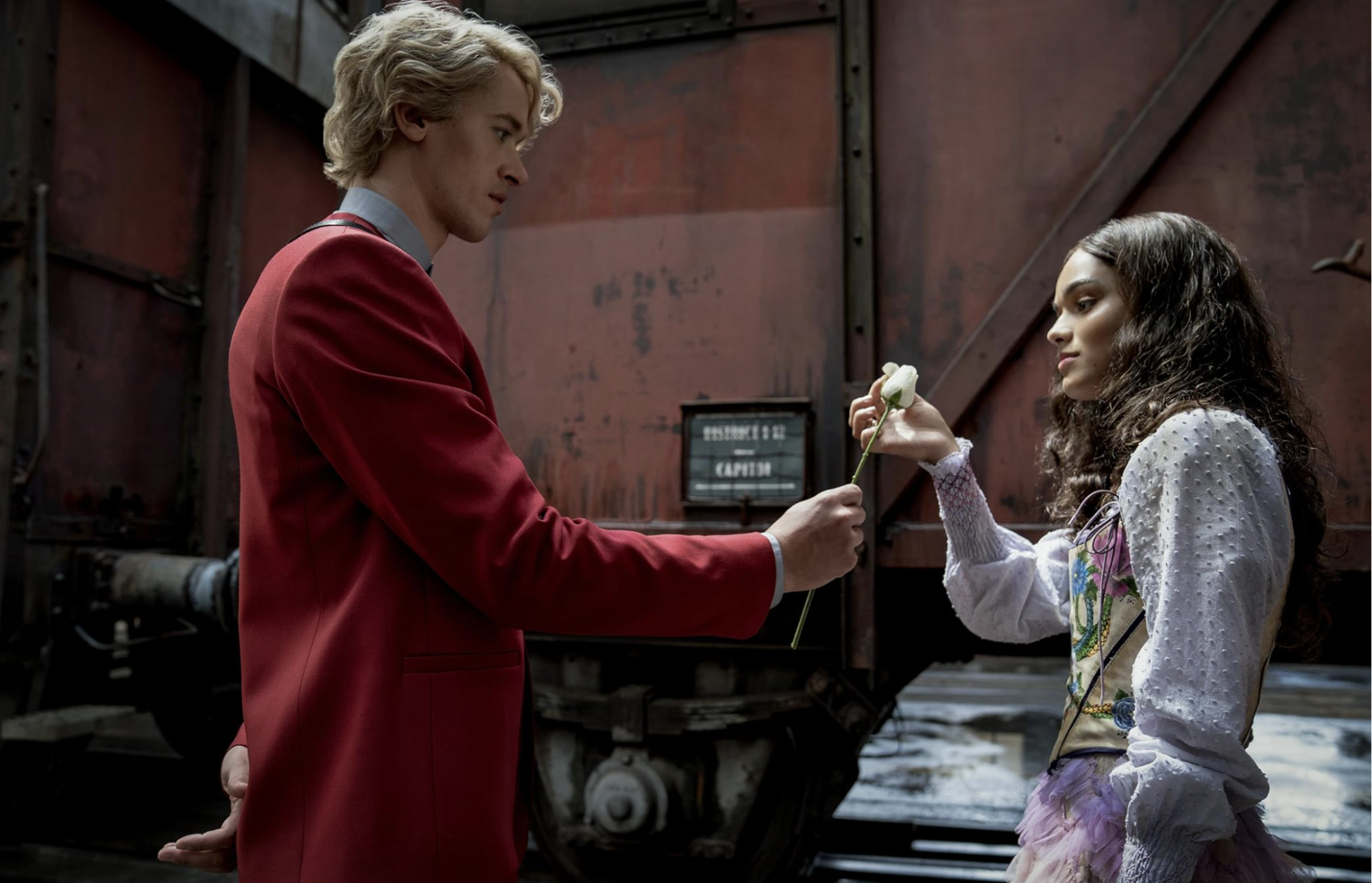Review | ‘The Ballad of Songbirds and Snakes’ lives up to expectations


Rachel Zegler and Tom Blyth in “The Hunger Games: The Ballad of Songbirds & Snakes” (2023)
In 2020, Suzanne Collins released her newest addition to the hit series Hunger Games Trilogy, a prequel titled “The Ballad of Songbirds and Snakes.” Last week, the novel took a new form as it premiered on big screens as a full-fledged movie.
Though the previous films depict President Coriolanus Snow as a wealthy man, this prequel presents viewers with a completely different character. Poverty-stricken and orphaned, Snow is dedicated to do anything he can to secure his success — no matter the cost.
The film follows young Snow in his quest to secure his status at the elite Capitol University through his performance as a mentor in the 10th annual Hunger Games — an event where the ruling Capitol government forces tributes from subjugated districts to fight to the death until one victor remains. In hopes of winning a full scholarship and financial security for his family, Snow throws himself into the mentor role with everything he’s got, bending rules wherever possible.
Prior to becoming an orphan, the movie reveals that Snow was the son of the famed Capitol military leader Crassus Snow. Before the commencement of the games, the students at the Academy, an elite secondary school for Capitol children, learn that in order to be considered for the university scholarship, known as the Plinth Prize, each student will be assigned to a tribute and expected to make a show of their performance to increase the game’s audience engagement.
When Snow is assigned Lucy Gray Baird, the “scrawny runt” from District 12, he immediately feels set to fail. That quickly takes a turn as Lucy Gray makes an early spectacle of herself when she is selected at the reaping, instilling both hope and confidence in young Coriolanus.
This ignition of confidence and dedication towards his tribute leads to a spiral of rule-breaking and tough decisions that lead to the eventual relocation of Snow away from the Capitol. From this point on, Coriolanus’ conscience leaves with him.
As Coriolanus is removed from the comfortable luxuries of the Capitol, his inherent instinct for survival sets in. This leads Snow down a road of deceit and betrayal of some of the closest people in his life, setting the stage for him to eventually become the President Snow audiences met in the first film set over 60 years later.
Overall, the film was effective in highlighting the power of human instinct in the face of survival. Arriving at the theater with the preconceived notion of hatred for President Snow, it was interesting to see a common sense of sympathy radiating in the silence of the theater for his former younger self.
The film produces an intriguing duality of consciousness. It was very odd to be rooting for those opposing the vicious circumstances of living in the districts while also rooting for the man behind franchising their pain.
One subtle difference between the novel and the film is the character of Lucy Gray. The novel seemed to emanate a larger sense of independence within Lucy Gray. It was surprising to see her immediate infatuation with Snow, though that may have just been a difference of interpretation.
The movie and the novel were very similar. Frustratingly, both ended with a heightened sense of uncertainty as to the status of Lucy Gray.
The movie could have improved with an elongated depiction of Snow’s time away from the Capitol. The movie was already almost three hours long, so it’s obvious why it’s not longer. However, I think the shortened version of Snow’s time away rushes his character development as a villain, possibly leaving those who have not read the book a bit confused.
The film used Snow to highlight the ways in which inherent selfishness overpowers humanity under the influence of an oppressive ruler. The narrative takes a young, desperate and struggling man with relatively good morals and turns him into a power-hungry monster who will do anything to achieve status, even if that means contributing to the murder of several of his peers.
Additionally, the film took a different approach to the typical forbidden love of its counterparts. Having Lucy Gray acknowledge her distrust for Snow physically and without dialogue placed an emphasis on the power and independence she possessed. It shifted the narrative away from the once-distressed, frail woman reaped for the Hunger Games to a strong, genuine woman who did not need to sacrifice herself for male validation.
In the final scene, Coriolanus asks his beloved cousin how he looks with his new suit, financed by his acts of betrayal. Her answer speaks great volume. She responds that he looks exactly like his father, alluding that he has shifted from the once lively genuine man she knew to one that has nothing but hate behind his eyes, setting the stage for the decades of turmoil that will come as a result of his power.
Recent Posts
SGB introduces new governing code bill and addresses rumors of ICE on campus
At its weekly meeting at Nordy’s Place on Tuesday, Student Government Board introduced an omnibus…
Opinion | School should be in the summer
Although this may be controversial, I believe that from this data, it is evident that…
Weathering the storm: Pittsburgh teams have tackled some of the toughest environments
The end of the year in western Pennsylvania is always marked by two things —…
Notes From an Average Girl // Notes on Book Banning
In this edition of Notes From an Average Girl, senior staff writer Madeline Milchman writes…
To Be Honest // Yup, it is that damn phone
In this edition of To Be Honest, staff writer Evin Verbrugge writes about her phone…
Meaning at the Movies | Portraying Toxic ‘Adolescence’
In this edition of Meaning at the Movies, staff writer Lauren Deaton explores the mini-series…

